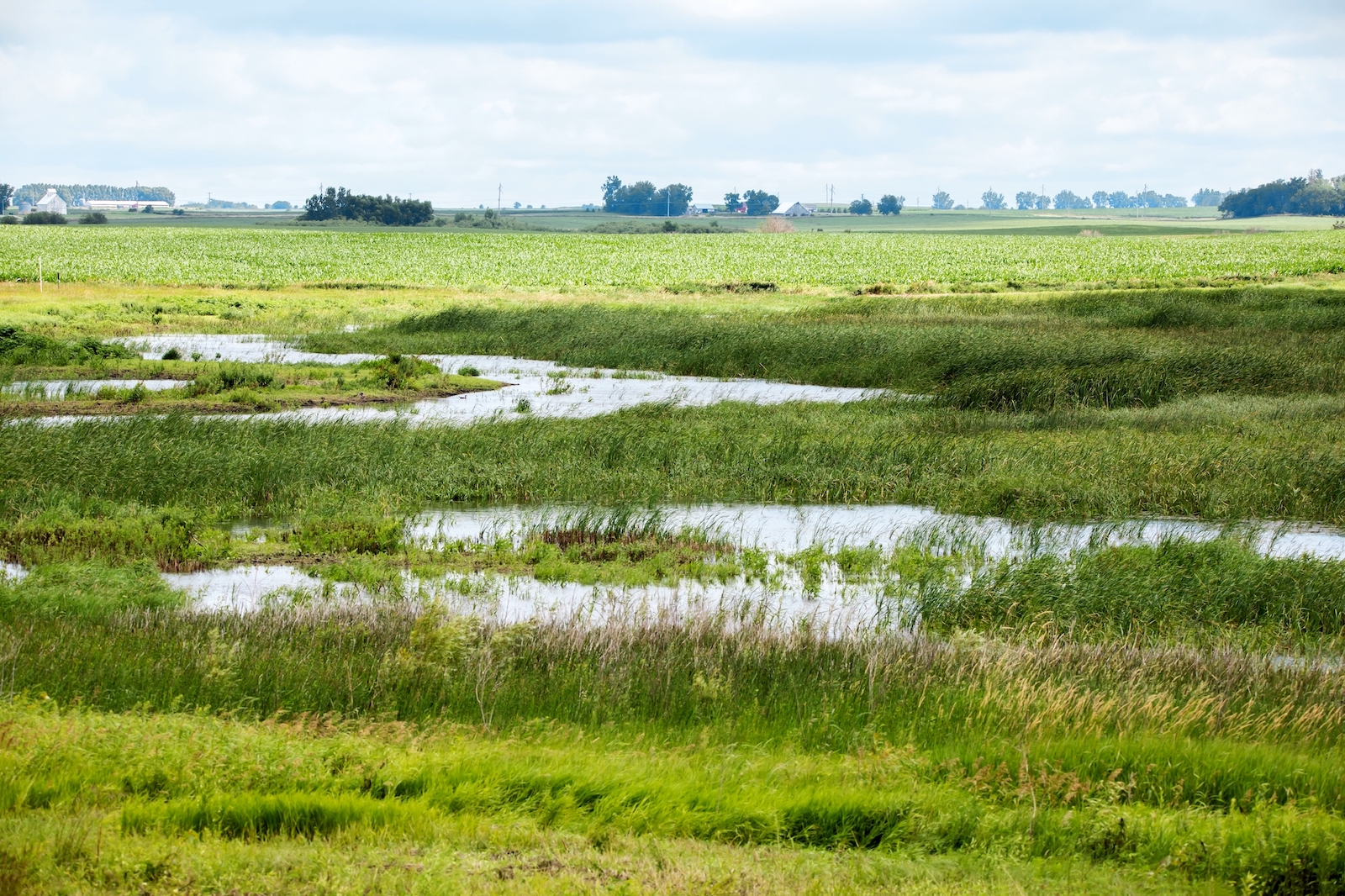Dani Replogle is a staff attorney with the national advocacy group Food & Water Watch.
The Midwest’s iconic prairie potholes and other wetlands across the nation are under attack. A politically motivated lawsuit targeting the popular “Swampbuster” provision of the 1985 Farm Bill aims to erode a policy that has protected wetlands and supported farmers for nearly four decades. The case–CTM Holdings, LLC v. U.S. Department of Agriculture–is now pending before the U.S. District Court for the Northern District of Iowa.
From cleaning water and providing wildlife habitat to mitigating droughts and flooding, wetlands perform a panoply of ecosystem services that benefit human health and safety. As the impacts of climate change intensify over the coming years, farmers and rural communities stand to benefit immensely from wetlands protected by Swampbuster. That’s why a group of sustainable agriculture groups including Food & Water Watch, Iowa Farmers Union, Iowa Environmental Council, and Dakota Rural Action have moved to intervene in the lawsuit that will decide the program’s fate.
Until now, Swampbuster has been one of the least controversial aspects of federal agriculture policy. The provision makes access to some U.S. Department of Agriculture funding contingent on compliance with common sense wetland conservation practices. Many farmers credit the program with preventing a race to the bottom when low farm profits might otherwise tempt farmers to drain environmentally valuable wetlands for additional crop acreage.
Contrary to farmers’ best interests, the absentee landowner plaintiff in this dangerous lawsuit has set his sights on eliminating the program entirely. His goal of eliminating Swampbuster–and the important ecosystem services wetlands provide–is straight out of the Project 2025 playbook.
Ridding the Department of Agriculture of conservation compliance requirements is a key facet of Project 2025, the Heritage Foundation blueprint that risks sowing humanitarian and ecological disaster. The Swampbuster case now pending before the U.S. District Court for the Northern District of Iowa is part of a larger conservative agenda to weaken the expert administrative agencies that manage the nation’s social and environmental programs. Members of this right-wing faction believe the Department of Agriculture–the agency that manages millions of acres of forest and farmland–should not concern itself with incentivizing responsible land management practices, never mind that these practices are critical to ensure functioning forests and arable land for future generations. But many farmers disagree.
Libertarian-leaning legal theorists like those at the Pacific Legal Foundation–the firm representing both plaintiffs in the ongoing cases–appear committed to dismantling all environmental protections for wetlands. Swampbuster is the latest protection on the chopping block, following the firm’s victory before the Supreme Court last year in Sackett v. EPA, which revoked Clean Water Act protection from many of the nation’s wetlands.
We won’t let them win again. After all, they have an uphill battle. Multiple courts have already agreed that placing reasonable restrictions on funding is a common and perfectly permissible policy tool for state and federal agencies to encourage people to act in the public’s best interest. Also, the plaintiffs will have a hard time claiming to speak for farmers, when they don’t represent a single one.
Although wetland destruction is just one of the many horrors housed within the pages of Project 2025, a successful attack on Swampbuster would mean serious and adverse consequences for America’s heartland. Farmers and their families deserve a seat at the table where decisions affecting their lives and livelihoods will be made. Watch this space — this fight is only just beginning.
Top image: Wetland landscape showing ponds and natural grassland on a summer day in Iowa. Photo by Katie Flenker, available via Shutterstock.


1 Comment
The amount of sheer gall demonstrated by this lawsuit...
…is impressive in and of itself. Taxpayers are already subsidizing incredible amounts of Iowa farm soil erosion. (Soil is being lost more than ten times as fast as it is being replaced on the average Iowa rowcropped acre). Taxpayer-subsidized Iowa farming is causing monumental amounts of water pollution. And then there’s the considerable damage (usually ignored) caused by farm pesticide drift, not to mention other farming-caused environmental problems.
Farm Bill conservation compliance requirements are already minimal, compared to the desperate need for more and better farm conservation. And now this lawsuit proposes that taxpayers be required to subsidize wetland destruction as well?!!
It should be noted that landowners and farmers are already free to opt out of the Farm Bill if they want to avoid conservation compliance. What CTM Holdings wants is to have that delicious Farm Bill subsidies cake and to eat it too, via freedom to destroy wetlands.
The Iowa farmers and landowners who are doing their very best, in a system that often works against them, to farm in ways that are truly sustainable, are absolutely not to blame. They deserve more public gratitude and support than they usually get.
But the Iowa Farm Bureau, Iowa’s largest farm organization, is NOT listed as part of the coalition that is fighting this lawsuit. The Iowa Farm Bureau has, for decades, used its huge political clout and piles of moolah to fight against pro-environment bills and policies. That has included actively (and successfully) opposing proposed Iowa wetland protection measures in the past.
The Iowa Farm Bureau absence from this lawsuit sends a real message. And thousands of Iowa farmers and landowners are members of the Iowa Farm Bureau. It is not a good look.
PrairieFan Fri 15 Nov 7:37 PM